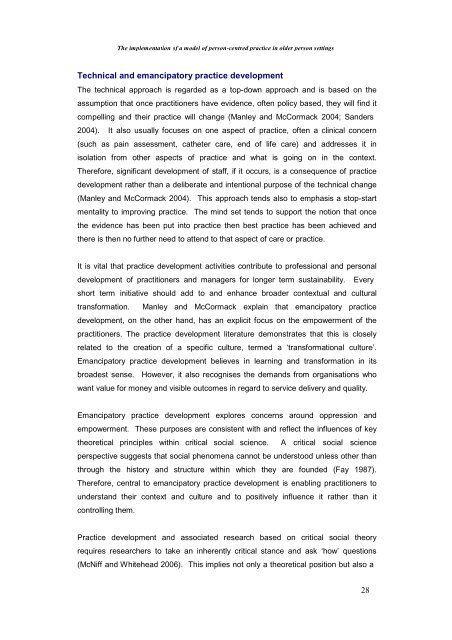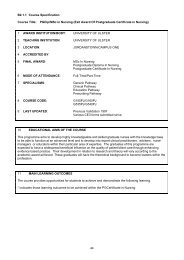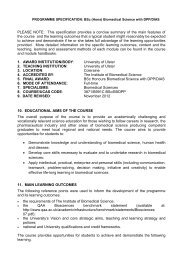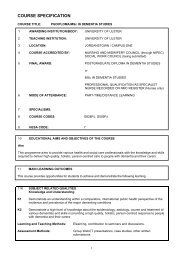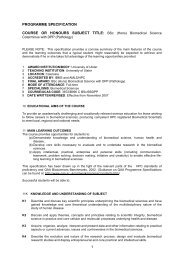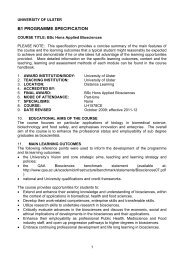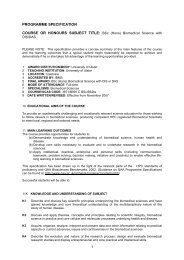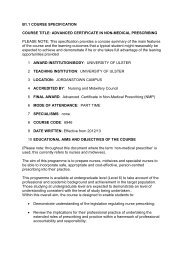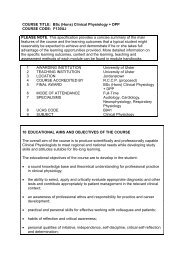The Implementation of a Model of Person-Centred Practice In Older ...
The Implementation of a Model of Person-Centred Practice In Older ...
The Implementation of a Model of Person-Centred Practice In Older ...
Create successful ePaper yourself
Turn your PDF publications into a flip-book with our unique Google optimized e-Paper software.
<strong>The</strong> implementation <strong>of</strong> a model <strong>of</strong> person-centred practice in older person settings<br />
Technical and emancipatory practice development<br />
<strong>The</strong> technical approach is regarded as a top-down approach and is based on the<br />
assumption that once practitioners have evidence, <strong>of</strong>ten policy based, they will find it<br />
compelling and their practice will change (Manley and McCormack 2004; Sanders<br />
2004). It also usually focuses on one aspect <strong>of</strong> practice, <strong>of</strong>ten a clinical concern<br />
(such as pain assessment, catheter care, end <strong>of</strong> life care) and addresses it in<br />
isolation from other aspects <strong>of</strong> practice and what is going on in the context.<br />
<strong>The</strong>refore, significant development <strong>of</strong> staff, if it occurs, is a consequence <strong>of</strong> practice<br />
development rather than a deliberate and intentional purpose <strong>of</strong> the technical change<br />
(Manley and McCormack 2004). This approach tends also to emphasis a stop-start<br />
mentality to improving practice. <strong>The</strong> mind set tends to support the notion that once<br />
the evidence has been put into practice then best practice has been achieved and<br />
there is then no further need to attend to that aspect <strong>of</strong> care or practice.<br />
It is vital that practice development activities contribute to pr<strong>of</strong>essional and personal<br />
development <strong>of</strong> practitioners and managers for longer term sustainability. Every<br />
short term initiative should add to and enhance broader contextual and cultural<br />
transformation. Manley and McCormack explain that emancipatory practice<br />
development, on the other hand, has an explicit focus on the empowerment <strong>of</strong> the<br />
practitioners. <strong>The</strong> practice development literature demonstrates that this is closely<br />
related to the creation <strong>of</strong> a specific culture, termed a ‘transformational culture’.<br />
Emancipatory practice development believes in learning and transformation in its<br />
broadest sense. However, it also recognises the demands from organisations who<br />
want value for money and visible outcomes in regard to service delivery and quality.<br />
Emancipatory practice development explores concerns around oppression and<br />
empowerment. <strong>The</strong>se purposes are consistent with and reflect the influences <strong>of</strong> key<br />
theoretical principles within critical social science. A critical social science<br />
perspective suggests that social phenomena cannot be understood unless other than<br />
through the history and structure within which they are founded (Fay 1987).<br />
<strong>The</strong>refore, central to emancipatory practice development is enabling practitioners to<br />
understand their context and culture and to positively influence it rather than it<br />
controlling them.<br />
<strong>Practice</strong> development and associated research based on critical social theory<br />
requires researchers to take an inherently critical stance and ask ‘how’ questions<br />
(McNiff and Whitehead 2006). This implies not only a theoretical position but also a<br />
28


